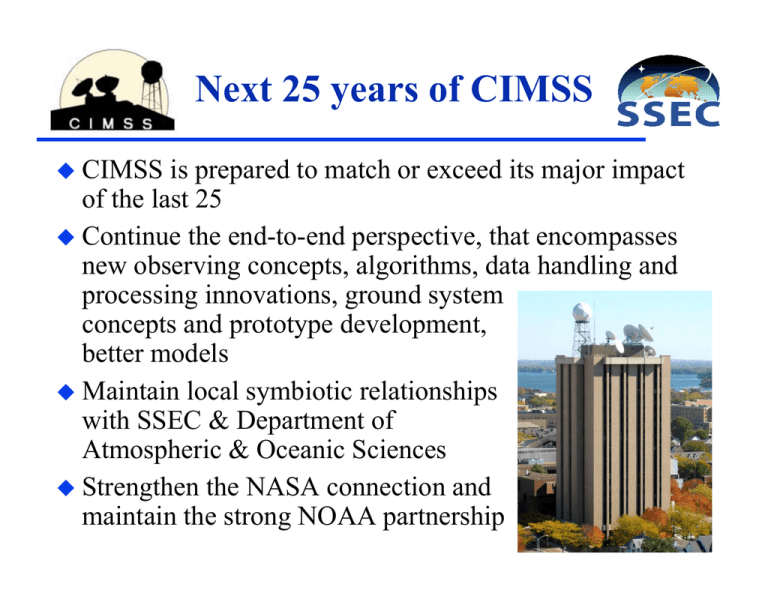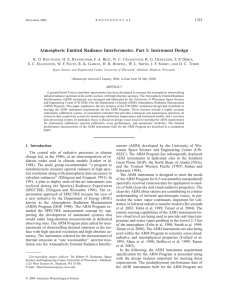Next 25 years of CIMSS
advertisement

Next 25 years of CIMSS CIMSS is prepared to match or exceed its major impact of the last 25 Continue the end-to-end perspective, that encompasses new observing concepts, algorithms, data handling and processing innovations, ground system concepts and prototype development, better models Maintain local symbiotic relationships with SSEC & Department of Atmospheric & Oceanic Sciences Strengthen the NASA connection and maintain the strong NOAA partnership Ratio Steve’s Conceptual Structure of CIMSS 7 6 5 4 3 2 1 0 A. 24-HR Temperature Ratio (NOSAT/NORAOB) DEC APR Season JUL Sounding: Much of what we are now starting will get more sophisticated & lead to ever growing impacts Sounding over land Simultaneous Cloud Characterization Unified spatial and spectral processing Routine Trace Gas retrieval Nowcasting NWP Impact Chemical Transport AIR Quality GIFTS/HES (GOES-R) CrIS + VIIRS + ATMS (NPOESS) GIFTS: Assembled & ready for Thermal Vacuum Testing at SDL SSEC Blackbodies June 2005 CrIS, AIRS Successor for NPOESS, will be even better 1. Radiometric Calibration: <0.4 K 2. Spectral Calibration: Instrument Line Shape (ILS) extremely well known and stable from first principles 3. Noise: 4x smaller than AIRS in the LW CO2 region Observed AIRS CrIS EDU Pure sinc Center FOV5 Edge FOV4 Corner FOV1 SW AIRS adjusted to 300 K scene Winds: Passive Infrared gives good coverage Tracking Retrieved Water Vapor Features Tracking from tandem S/C & 2nd View angle for Stereo NWP Impact GIFTS/HES Stereo Cloud & WV Imaging--polar orbit MODIS Polar Water Vapor winds Routine production Started in 2003 Large forecast benefit demonstrated! UW Design for Simple Polar Orbiting Imager 4 Silicon micro-bolometer Imaging Array Cameras Science • IR Cloud Information • Stereo Cloud Height • Winds (flying in orbit with NPP) Calibration Blackbody Rotatable Scene Mirror Cross-track Fields of View IRCIR Provides Full Cross-track Coverage using Four Uncooled 640 x 480 Arrays Protective Drum Baffle (rotates with Scene Mirror) And don’t forget LIDAR for winds & clouds: the local talent is definitely some of the best Arctic HSRL (High Spectral Resolution Lidar) Climate (1): New Small Satellite Constellation to benchmark change for future generations & to upgrade operational measurements IR Spectra Occultation Refraction & Absorption Solar Irradiance Spectra Solar Reflected Radiance Spectra Climate Properties (Level 3) Absolute Climate Change Records Climate Benchmark Satellites + NPOESS & GEOs THE CLIMATE BENCHMARK CONSTELLATION A Critical Category of Small Satellite Observations Absolute IR Spectrally Resolved Radiance Microwave Occultation & Cross-link Absorptive Radio Occultation Spectrally Resolved Absolute Solar Irradiance & Shortwave Reflected Radiance [Harvard U, U of Wisconsin, NIST, U of Colorado, Southwest Research Inst, U of Graz] Climate (2): NPOESS Preparatory Program (NPP) to evaluate NPOESS Products (EDRs) and generate Climate Data Records (CDRs) Atmosphere Product Evaluation and Algorithm Test Elements (PEATE) of NPP Science Data Segment ** Cal/Val ** NPOESS Instruments CDRs Absolute Climate Change Records S-HIS & NAST: Tool for Research & Satellite Validation S-HIS on WB57 Proteus (IPO & ARM-UAV) S-HIS on Proteus 14 km altitude, 16 Nov 2002 NAST We still have much to learn from the NAST and S-HIS aircraft Instruments Look to add many more products to our work on Climate Trends Comparison of Total Cloud Amount Trends The figure shows Total Cloud Amount time series from 60S to 60N for July •PATMOS-x does not exhibit the downward trend seen in ISCCP •Differences in magnitude are likely due to PATMOS-x weighting of partly cloudy pixels. ISCCP and HIRS do no weighting of partly cloudy pixels PATMOS-x trends are preliminary until calibration work is finished Patmos: Andy Heidinger & Mike Pavolonis UW/HIRS: Paul Menzel & Don Wylie GEOSS: The ground-based Component is important too Direct Broadcast Algorithms for Widely Distributed International Applications Aviation Weather Products ARM-like Cal/Val Networks AERI Network for Convective initiation & Water Vapor Fluxes Aviation Safety AERI SYSTEMS AROUND THE WORLD UW AERI - 2 (AERIBAGO, SSEC) DOE AERI - 7 (Kansas/Oklahoma, Alaska, S. Pacific) U-Miami M-AERI - 3 (Florida) Bomem AERI - 4 (Italy, California, Maryland, Canada) U Idaho P-AERI - 1 (Antarctica) ARM Site Atmospheric State Best Estimates NSA SGP TWP EOS Direct Broadcast Sites Moscow Madison, WI Benevento, Italy 86 sites were known in Nov. 2003 Now more than 100 Beijing,China Modelling: Both NWP and Chemical Transport will be keenly important Isentropic Coordinates Chemical Transport Cloud Assimilation NWP Impact Chemistry AIR Quality Collaboration - NASA Langley and the University of Wisconsin - Madison UW Hybrid θ-η Model Global model NASA Langley Impact Model Chemical Module UW - NMS Regional model Don Johnson’s group with Brad Pierce, NASA LaRC Assimilating Cloudy GOES Imager Obs into CRAS A. Eta Model First Guess B. GOES Tb observations for Assimilation-“Truth” C. CRAS Accepts the information & Maintains improved GOES Correlation for > 48 hours Operational Systems: Key activities for CIMSS Participation & Innovation Prototype Data Systems: Optimum use of algorithms, software, systems architecture, special purpose hardware to optimize access & performance in operations Cal/Val: analysis & technique devel GOES-R NPOESS Timely & Accurate NWP input Next 25 years of CIMSS NWP impact from IR soundings & winds has really just begun: the next 25 should see impressive progress Expect CIMSS will – – – – – Continue to balance and blend work with GOES & POES, Put more emphasis on climate, Further blur the distinction between imaging and sounding approaches, Promote instruments to improve winds from polar orbit Consider the development hardware/software system techniques for proving and prototyping operational feasibility of new algorithms – Purse new observing systems (e.g. SIRICE submm and IR) The NASA partnership with NOAA should be enhanced— assure a route for demonstration missions to proceed operational system development—CIMSS should work to play a key role in this process, and work to strengthen its NASA connection Continue strong commitment to education and training

